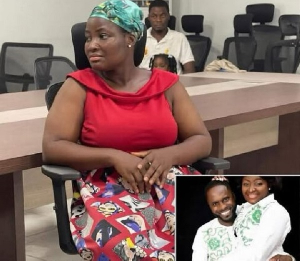On 17 October this year, Francis Kwarteng published on this portal and others an important essay titled, "Mabel Dove-Danquah: A Trailblazing Author, Feminist, Politician, Activist & Journalist." As far as we are concerned, one of the major points discernible from that essay was the extent the role of Ghanaian women (e.g., Ms. Mable Danquah) have practically been written off Ghana's history books, and completely neglected even in education literature . In other words, Ghanaian women, like most women in the world have had their roles in the development of societies all over the world hidden, many times erased completely. That, sadly, had been the story of Mabel Dove-Danquah, perhaps in the ranks of the "Yaa Asantewahs" of the latter-day pre-Independence Ghana.
As we commented:
"...Mabel Dove-Danquah is truly a trailblazer and pacesetter who was long-buried in history by the cobwebs and funk of male chauvinism, cultural anachronism, political self-contentedness, and crass political grandstanding that only serve(d) to keep thieves at the head of the table in society..."
Also, a comment on Ghanaweb by "SOWAH" was the most interesting and elevating. Commented "SOWAH":
"....Miss Dove was my mentor to all people who stayed with her st tech may God bless us and her ancestors especially sister Ella late bro franklin and bra nii adoo...".
If "SOWAH" is reading this piece, or anyone knows "SOWAH," we ask that they contact us via www.GhanaHero.com. (Please kindly type "DOVE-DANQUAH" in the subject line).
As a humble tribute to Ms. Mabel Dove-Danquah, one of Ghana's greatest writers, a trail-blazer, and a Journalist's Journalist, and the women in our lives and everywhere, we post an essay by Professor Justin Wolfers of University of Michigan. In the article below, Professor Wolfer addresses similar type of gender discrimination in the academy and popular press even today. It is discrimination against economists who happen to be women. Many times, these women are more important and more powerful than their male collaborators who, though comparatively "inferior", are nonetheless usually elevated on a pedestal by sundry writers, including some we may even consider "progressive" and/or "feminist".
So read on, partner!
READ....
NOV. 11, 2015
Gender Gap: Even Famous Female Economists Get No Respect,
by
Professor Justin Wolfers, Professor of Economics and Public Policy, University of Michigan
"Men’s voices tend to dominate economic debate, although perhaps this is shaped by how we talk about the contributions of female economists. This is easiest to see in how we discuss the work of economist power couples.
Remembering the journalistic cliché that one is an example, two is a coincidence and three is a trend, I figured it worth exploring how female economists are treated.
First, consider an example from The New York Times. In a recent article, Adam Davidson wrote that “Lawrence Katz, a professor at Harvard and a leading scholar of education economics, co-wrote a paper a few years ago with Claudia Goldin...” Professor Katz’s apparently uncredentialed co-author in that case was also a professor at Harvard, a leading scholar of education economics, a recent president of the American Economic Association and one of America’s most important economic historians. Moreover, Ms. Goldin was actually the first author on the paper, a fact that the public or journalists may not pay much attention to, but one that matters greatly in the academic guild.
Economists typically deviate from an alphabetical ordering only when they intend to signal that someone is a junior or secondary author, and this paper was not signed “Katz and Goldin.” Mr. Davidson subsequently adjusted his article and apologized to Ms. Goldin. (Full disclosure: Mr. Katz was my dissertation adviser, and Ms. Goldin, his romantic partner, is a dear friend.)
Second, Ralph Nader decided to enter the debate on monetary policy recently with an open letter to Janet Yellen, the chairwoman of the Federal Reserve. It was, to be charitable, a rather confused missive — and confusing enough that history may rate Mr. Nader as a more successful presidential candidate than economist. But the real clunker came with his advice to Ms. Yellen that “I think that you should sit down with your Nobel Prize-winning husband George Akerlof.” His directive continued: “Together, figure out what to do.”
'IT IS NOT CLEAR WHY MS. YELLEN WOULD NEED HER HUSBAND’S HELP TO DO THIS. SHE IS AN ACCOMPLISHED ECONOMIST IN HER OWN RIGHT, AND ARGUABLY THE MOST POWERFUL ECONOMIST IN THE WORLD. MOREOVER, IF MS. YELLEN NEEDED HELP FIGURING ANYTHING OUT, SHE WOULD BE UNLIKELY TO NEED TO RELY ON HER HUSBAND, AS SHE HAS HUNDREDS OF PH.D. ECONOMISTS WORKING FOR HER. AND WHILE MR. AKERLOF IS A BRILLIANT ECONOMIC THEORIST — INDEED, HE IS ONE OF MY FAVORITE ECONOMISTS — HE WOULD BE THE FIRST TO ADMIT THAT HE IS NOT A LEADING AUTHORITY ON MONETARY POLICY' (Caps Ours).
And most recently, the latest edition of the Slate political podcast, “Political Gabfest,” featured a discussion about the headline-grabbing research by Anne Case and Angus Deaton that found that the death rates of middle-aged white Americans were increasing, even as death rates were falling in other countries. Slate’s David Plotz described the research as having been written by “Nobel Prize-winning economist Angus Deaton and Anne Case, who is his wife, and also a researcher.” Likewise, Ross Douthat, writing in The New York Times Sunday Review, described this as research by “Nobel Laureate Angus Deaton and his wife, Anne Case.”
Ms. Case is far more than a wife and a researcher. She is a professor of economics and public affairs at Princeton, one of the leading health economists of her generation, and has been elected a fellow of the Econometric Society. She is also the first author of the mortality study.
And just as Mr. Plotz and Mr. Douthat confused the author ordering, so too did Martin Sandbu, an economics columnist for The Financial Times, as did The New York Times’s Gina Kolata, who called this research “the Deaton-Case analysis.” This may reflect the journalistic tendency to follow the more exciting narrative, and Mr. Deaton’s recent Nobel Prize certainly made him a newsworthy figure. But even Paul Krugman, who made his reputation as an economist rather than as a journalist, and who spent many years as a colleague of Ms. Case and Mr. Deaton at Princeton, made the same mistake in his column in The New York Times.
Now perhaps this isn’t a trend of underweighting the contribution of female economists, but rather a handful of careless mistakes. Eager to learn more, I reached out to the male halves of these power couples, to find out if they had ever been inadvertently demoted to second-author status, or otherwise been given insufficient credit. Mr. Katz said that such mistakes were rare, but that in his experience, it was less likely that he be given insufficient credit than Ms. Goldin.
Mr. Akerlof responded, “No, I cannot recall ever being slighted in this way.” And Mr. Deaton said, “I can’t recall a case where I was slighted or given less than my due.” He also told me that he thought that this sort of problem “was not good for women in science, nor domestic harmony (or even Anne’s willingness to work with me).” His assessment of the problem: “I think it is real enough.”
The accumulation of these slights suggests that even the world’s best female economists are given second billing too often. And none of this is intended to impugn the motives of any economic commentator. Rather, I suspect that there’s a simple unconscious bias at work here. Close your eyes for a moment, and picture an economist. Odds are you pictured a man. (Chances are, he was also white, most likely middle-aged, and probably fairly confident.) This same reflex makes it easier to recall those who fit this pre-conceived idea of what an economist looks like.
Of course, I have an interest in this, as I’m also partnered with a fellow economist. And so I can add one more story to this list. Anne-Marie Slaughter published a widely read article in The Atlantic on “Why Women Still Can’t Have It All.” My better half, Betsey Stevenson, was pleased to see our joint research described in the article, but was chagrined to discover Ms. Slaughter had demoted her from first to second author on the paper. At the time Ms. Slaughter’s article was published, Betsey was serving as chief economist at the U.S. Department of Labor, where she had developed a much larger footprint on work-family balance issues than I ever had.
It left Betsey to suggest — only half-jokingly — that the reason women can’t have it all is because even leading feminists don’t give them credit."
SOURCES:
1. Francis Kwarteng. Mabel Dove-Danquah: A Trailblazing Author, Feminist, Politician, Activist & Journalist. Ghanaweb, 17 October, 2015.
2. New York Times (http://www.nytimes.com/2015/11/12/upshot/even-famous-female-economists-get-no-respect.html?hpw&rref=upshot&action=click&pgtype=Homepage&clickSource=thumb&module=well-region®ion=bottom-well&WT.nav=bottom-well&_r=0).
GhanaHero.com. WWW.GhanaHero.com.
Visit for more information.
(Read Mo! Listen Mo! See Mo! Reflect Mo!).
©Prof Lungu is Ghana-centered/Ghana-Proud.
Prof Lungu is based in Washington DC, USA.
In Celebration of the Woman in Ghana and Everywhere!
Brought to you courtesy www.GhanaHero.com©13 November, 2015.
Opinions of Friday, 13 November 2015
Columnist: Lungu, Prof.














